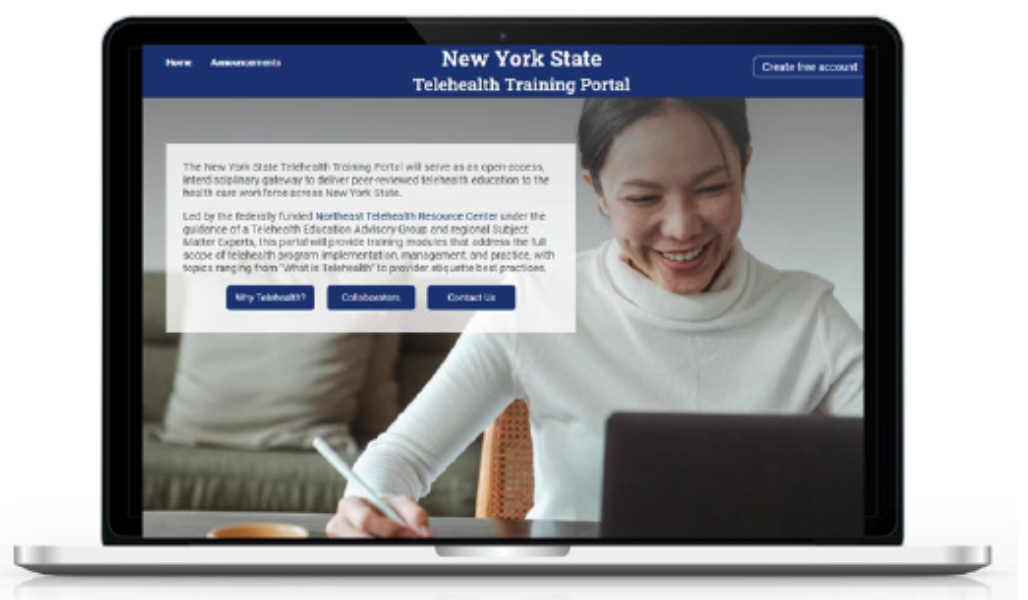
Stony Brook Medicine and the Northeast Telehealth Resource Center (NETRC) recently launched a new, eight-part Interprofessional Telehealth e-Learning course on the New York State Telehealth Training Portal. The course provides a comprehensive overview of interprofessional telehealth practice and is informed by the core competencies of Interprofessional Collaborative Practice and Telehealth as defined by the Interprofessional Education Collaborative (IPEC) and the Association of American Medical Colleges (AAMC).
This series was developed by the Interprofessional Telehealth Board at Stony Brook University, an academic collaborative composed of representatives from the five health sciences schools, including the School of Dental Medicine, School of Health Technology and Management, Renaissance School of Medicine, School of Nursing, and School of Social Welfare. The Board, established in 2017, creates educational resources for the healthcare community and develops standards for the practice of telehealth across disciplines. In addition, the Board facilitates interprofessional research, creates and suggests interprofessional curricula, and explores interprofessional clinical experiences.
This Interprofessional Telehealth Course highlights relevant issues related to telehealth and interprofessional competencies from multiple perspectives. Modules include:
• Introduction to Interprofessional Telehealth Education
o Identifies key concepts and foundational principles of interprofessional telehealth
practice including the importance of virtual teams in telehealth. The module describes the efforts of Stony Brook Medicine’s Interprofessional Telehealth Board as a replicable model of educational collaboration and encourage further educational development in interprofessional telehealth practice and research.
• Introduction to Telehealth Practice
o Introduces telehealth practice for interprofessional telehealth providers. After
completion of this module, participants should be able to discuss characteristics of an effective telehealth camera presence; present and discuss an introduction to effective communication strategies; and identify current users and use cases.
• Introduction to Telehealth Technology
o Introduces the evolution of telehealth technology, including its core components,
modalities and workflows, implementation possibilities for small to large practices, and challenges associated with telehealth technology.
• Telehealth Compliance, Regulation and Consents
o Reviews telehealth and its relationship to compliance, regulation, and consents by
facilitating a general understanding of the breadth of current telehealth law and compliance issues; acknowledging traditional fraud and abuse laws through the lens of telehealth; and anticipating the needs required to ensure compliance with the law going forward. The module concludes with a case study that facilitates a practical application of these principles.
• Telehealth Ethics and Inclusivity
o Discusses the ethical questions that surround telemedicine, as well as how to practice
telemedicine in an inclusive manner. This module lays the groundwork for some of the primary questions and ethical considerations to keep in mind in this rapidly developing field.
• Telehealth and Roles/Responsibilities and Teamwork and Interprofessional Education and Practice
o Examines telehealth and its relationship to professional roles and responsibilities, as well as teamwork. The module concludes with a case study that gives a practical example of these principles.
• Telehealth and Communication
o Provides students with foundational knowledge about the importance of effective
communication when working with other healthcare professionals, patients and their families using telehealth and provides strategies for effective communication during interprofessional practice and telehealth.
• Telehealth Interprofessional Student Projects
o Introduces applied learning activities for telehealth clinicians. Beginning telehealth
learners will forge interdependent relationships with other professions within and outside of the health system to improve care and advance learning. Advanced telehealth learners will maintain competence in one’s own profession appropriate to their scope of practice.
Stony Brook Medicine’s Interprofessional Telehealth Series can be found on the NETRC’s New York State Telehealth Training Portal (www.NYTelehealth.NETRC.org). The Portal serves as an open-access, interdisciplinary gateway to deliver peer-reviewed telehealth education to the health care workforce across New York State. The training portal is endorsed by the Reimagine New York Commission and has been guided by a New York State Telehealth Education Advisory Group.
For more information about telehealth training initiatives in New York State, please review the Reimagine New York Commission’s Action Plan for a Reimagined New York.
